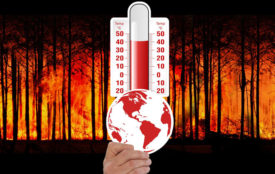Heat record after heat record
At the beginning of July 2023 there was a national heat record in Germany, in the middle of July the hottest day in history and at the end of July we know that this summer month was the hottest July since 1870. And this despite the fact that the last days of July were rainy and cool in our country.
We just have to learn to distinguish between short-term weather and long-term climate. If it is hot in southern Italy and snowing in the Alps on the same day, then that is exactly the climate change that climate scientists have been predicting for 40 years – through extreme weather.
Without man-made greenhouse gases such as CO2, methane or nitrous oxide, this situation would not have become possible. There is a fundamental difference between one billion people needing energy, as was the case 200 years ago, and eight billion people needing energy today. In addition, people in the rich industrialized countries will consume about twenty times as much energy per capita in 2023 as they did 200 years ago. And a Chinese person today consumes about five times more than 50 years ago. That’s why the climate crisis is not a distant spectre, but already the greatest challenge of our time.
Brutal hot summers, extreme ice melt, catastrophic forest fires and worldwide coral die-offs are already happening today and will probably happen even more tomorrow. My local newspaper, the “Badische Neueste Nachrichten,” has the headline: “The world has never been so hot”
This extreme heat is man-made
In many regions such as China, India, California, Canada, Mexico or Southern Europe and North Africa, the heat and forest fires are therefore climbing from record to record. It’s as if the earth is virtually roaring at us with its storms, conflagrations and heat waves. But in the meantime it is also roaring under the seemingly still paradisiacal sea, leading to catastrophic coral bleaching. The North Atlantic is also warmer than ever. Off Florida’s coast, 38 degrees Celsius was measured these days – bathtub temperature – a threat to animals and plants.
But the climate crisis is also a health crisis for us humans. Already in the heatwave summer of 2003, 61,000 people died from the heat in Western Europe, and in 2021, more than half a million in China.
In Germany, a heat protection plan is finally being discussed. That means green facades, forests in the city and green sponge cities that store increasingly precious drinking water as heavy rainfall increases.
Our earth has fever
At 37.5 degrees a person has a slight fever, but at 42 degrees it becomes life-threatening. Already in the summer of 2023, the heat becomes life-threatening for many people in Greece. At the end of July, 500 forest fires blaze all over Greece. This was unpleasant for German tourists there because their vacation was messed up, but thousands of Greeks lost their belongings.
Under the headline “Alarm Stage Hot”, “Die ZEIT” draws these three lessons- First: Germany, too, has slept through climate change and the switch to 100 percent renewable energies in the last 30 years, so the traffic light government must now step on the gas. Second: Germans must not just pay lip service to the energy transition in polls, but must accept that there can be no energy transition without a heat transition and a transportation transition. And third: Only the rapid liberation from fossil energies can (perhaps) still save us.
We are currently experiencing the hottest year of our lives and probably the coolest for the rest of our lives. In concrete and practical terms, this means that we are facing unimaginable famines and huge streams of refugees – including to Germany.
There is only this one way out – says climate science: switch completely to renewable energies by 2035. The scientists have been wrong on only one point so far: the climate catastrophe is coming faster than they predicted.
“If the catastrophes we experience this month are not enough to shake us out of our torpor, the chances of us lasting another 150,000 years seem slim,” in the U.S. magazine “The New Yorker”
- Klimareporter: „Golfstrom könnte schon in wenigen Jahren kollabieren“ | “Gulf Stream could collapse in just a few years” –The Atlantic overturning circulation will collapse before the end of this century, a new study predicts. Despite criticism of the forecast, it is becoming apparent that the risk of the tipping Atlantic current has been underestimated so far.
Source
Franz Alt 2023 | Translated with www.DeepL.com/Translator (free version)








